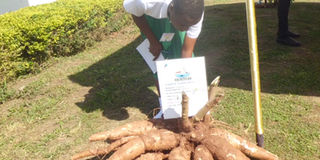Essay challenge brings students’ knowledge on biotechnology to life

Resty Nsubuga gets the feel of an improved cassava variety before receiving her award as the best essay writer in the secondary section at the National Crop Research Institute in Namulonge recently. Photo by Lominda Afedraru
What you need to know:
- In order to encourage knowledge about modern biotechnology secondary and university students competed in writing about Modern Biosciences for more nutritious food to win awards.
In a bid to familiarise students with modern biotechnology, National Crop Resources Research Institute (NaCRRI) organised the Biotechnology Essay Writing Contest among secondary and university students.
Resty Nansubuga, the 17-year-old science student at St Joseph’s Girls Senior Secondary School, who scooped the best essay award in the secondary school category, says she only learnt about plant breeding using modern biotechnology in a bid to develop Genetically Modified Organisms crops from her teacher recently.
Her essay focused on breeding of improved crop varieties to make nutritious food under the theme; “Modern Biosciences for more nutritious food”.
She explained the use of breeding crops using advanced technology to develop improved varieties which have better nutrition and are high yielding hence capable of feeding the world’s growing population.
Organised by the Uganda Biosciences Information centre, the competition attracted several students who, like Nansubuga, had scanty knowledge about crop breeding.
Widespread issue
But this lack of knowledge is also true in majority of Ugandans who are ignorant about plant breeding using modern biotechnology and mistake improved plant varieties such as hybrids with GMOs.
Thus scientists at NaCRRI have put in efforts to sensitise school children right from primary to university level by organising essay competitions where the students are required to search for information about application of modern biotechnology in plant breeding.
The 6th edition of the essay competition awardees were given certificates, plaques, laptops and a one-week internship training at NaCRRI.
This was the first time most of the competing students were visiting the research institute and its laboratory where tissue culture cassava breeding is being done by breeding them in tests tubes.
The students were also amazed to see tissue culture cassava growing from test tubes to a full plant in the field.
Enlightened
Nasubuga was excited to receive her award and promised to sensitise fellow students at her school and other communities on the importance of scientists using emerging technologies to breed crops.
“I do not see any difference between improved cassava, maize and rice varieties with the traditional varieties being tested at the institute. I have heard that many Ugandans are opposed to improved crop varieties but it seems people lack knowledge about what the scientists are doing,” she asserted.
Students submitted essays under the topic modern Biosciences to produce better nutritious food while Nsubuga focused on breeding of improved crop varieties to make nutritious food citing orange sweet potato and cassava which is bred conventionally and pro vitamin A treangenic banana which contains Vitamin A, Iron and Zinc.
She is optimistic that she will encourage fellow students to read scientific books to get knowledge especially in Biosciences be it in crop breeding of applied science to developing vaccines and drugs in the health sector.
For Marvin Steven Nsubuga, the overall winner in the tertiary and university category, this is his third time participating in the awards. He submitted his first essay in 2015 when he was a Senior Five student and won an accolade, a certificate and a one-week internship at the institute.
Nsubuga, a first year Administrative Science student at Kyambogo University, researched on using applied modern biotechnology to breed crops which can be used as a raw material in order to boost the industrial sector. He focused on crops such cassava which farmers will be able to grow and get high yields which can be supplied to brewing industries.
“The starch can also be used to process glue and highly processed cassava flour used by industries processing confectionary products. I am currently disseminating this information for government to make good policy,” he noted.
On his third time competing, Nsubuga scooped a certificate, plaque, a laptop and a one week internship at the institute.
More student research
He is encouraging university students to be in search of scientific information, especially in agricultural science where scientists are breeding crops to address challenges of climate change and devising ways of feeding the growing population in the world.
National Agricultural Research Organisation board chairman, Prof Joseph Obua, urged students to pursue science subjects because science is a driver and engine of economic growth of all nations.
“I am urging teachers to use the best methods when teaching science subjects; make it simple and practical. This is because children tend to shy away from science subjects because teachers are using complex words which scare them. It is important to simplify the words for students to appreciate science, technology and innovations,” he noted.




